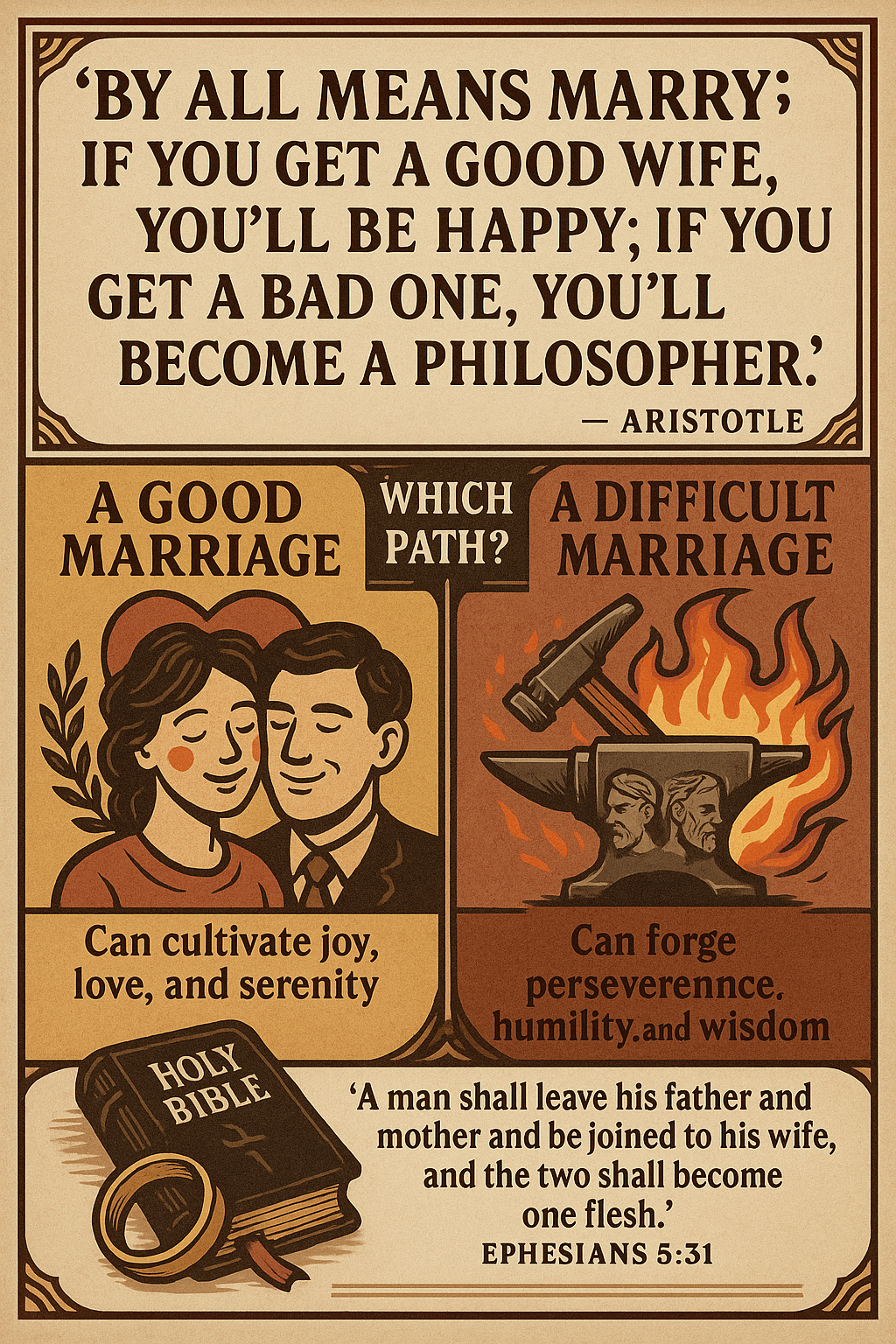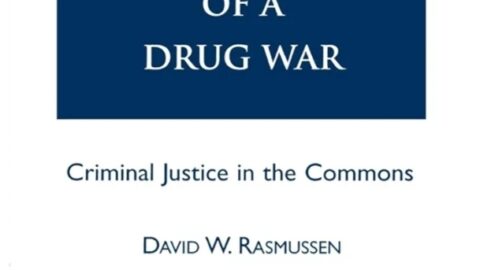Introduction: Wisdom Through Wives—An Ancient Irony
The quote “By all means marry; if you get a good wife, you’ll be happy; if you get a bad one, you’ll become a philosopher”—often misattributed to Aristotle (more accurately aligned with Socratic irony)—is a brilliant aphorism that blends humor with profound insight. Behind the wit lies a deep truth: marriage is both a mirror and a forge. It reveals the best and worst in us—and in doing so, becomes either a source of joy or a crucible for wisdom.
This article explores the meaning and applications of this paradox in psychological, relational, philosophical, and spiritual terms. It also examines how marriage shapes human growth and exposes the self—through happiness or hardship.
Interpreting the Irony: More Than a Joke
At first glance, this quote sounds like a cynical joke: “If your wife makes you miserable, at least you’ll gain wisdom!” But beneath the irony lies a profound Stoic and Socratic principle:
- A good marriage cultivates joy, harmony, and companionship.
- A difficult marriage confronts you with suffering, forcing reflection, humility, and inner transformation.
In both cases, marriage becomes a path to growth—either by love, or by fire.
Marriage as a Mirror
Whether joyful or painful, marriage reveals:
- Your weaknesses: pride, impatience, selfishness.
- Your habits: defensiveness, communication style, emotional maturity.
- Your worldview: what you believe about love, sacrifice, duty, and trust.
A good spouse supports your better self. A difficult spouse exposes your brokenness—and may even force you to reckon with things you would never confront alone.
“Marriage is the greatest mirror of the soul, for the one closest to you will not merely observe—but be affected by—who you truly are.”
The Path of the Philosopher: Pain as a Teacher
Philosophy literally means “the love of wisdom.” For many, wisdom is not born in peace—it is forged in discomfort, heartbreak, and reflection. A difficult marriage, like any intense struggle, becomes:
- A school of patience: learning to restrain emotion and respond with maturity.
- A lesson in empathy: seeing life through another’s pain or imperfection.
- A challenge to pride: letting go of the need to be right or in control.
- A reassessment of truth: understanding love as something deeper than feeling.
Thus, the “bad wife” is not praised—but rather the philosopher she inadvertently produces. She becomes a catalyst, not a cause, of wisdom.
Spiritually: Marriage as Sanctification
In Christian and other spiritual traditions, marriage is not primarily about happiness, but holiness—about conforming the soul to love, truth, and sacrifice.
“Husbands, love your wives, just as Christ loved the church and gave Himself up for her…” – Ephesians 5:25
Even in pain, God uses marriage to:
- Refine character.
- Teach sacrificial love.
- Expose sin, pride, and unforgiveness.
- Reveal how much we depend on grace.
So while a joyful marriage can embody divine love, a struggling one can drive a soul to its knees in search of it. Both are sanctifying. Both are teachers.
When Happiness Fades, Reflection Begins
In many modern marriages, couples pursue comfort, romance, or validation—and when those fade, they believe the marriage has “failed.” But Aristotle’s wisdom suggests the opposite: when things become difficult, the opportunity for true philosophy—wisdom, humility, transformation—begins.
“You don’t fall out of love. You fall out of illusion—and then you choose whether to learn how to love.”
Thus, if you get a “good” spouse, be grateful.
If you get a “bad” one, don’t escape—awaken.
Applications of the Quote in Real Life
In Counseling
- A common phrase among counselors: “Your spouse will trigger your unresolved wounds.”
- Therapy becomes a form of philosophy—asking why, seeking clarity, and healing through truth.
In Parenting
- The example you set in marriage is often more powerful than any lesson you teach.
- Children learn conflict resolution, forgiveness, resilience, or bitterness—by watching.
In Society
- Strong marriages contribute to community health, economic stability, and emotional well-being.
- Broken or bitter marriages, when multiplied, ripple into societal dysfunction.
In the Individual
- Marriage becomes a tool for self-awareness.
- The pain of conflict forces reflection: Who am I? What do I value? What am I becoming?
When to Stay, When to Grow, When to Leave
It is important to note:
- The quote doesn’t imply one should remain in abusive situations.
- There is a difference between a “difficult marriage” and a destructive one.
- Suffering can bring growth—but not all suffering should be tolerated.
The philosopher discerns:
- Is this pain purposeful or pathological?
- Is growth possible—or is this a call to righteous separation?
Wisdom lies in discerning the difference.
From Marriage to Meaning
“By all means, marry,” says the philosopher. Because whether your path is filled with joy or hardship, you will not leave unchanged.
- If you marry well, love will refine you.
- If you marry hard, suffering will deepen you.
- Either way, marriage becomes a mirror—revealing the condition of your soul.
You may find happiness.
You may find sorrow.
But if you respond with humility, courage, and reflection…
you will find wisdom.
Humor, Wisdom, and the Sacred Weight of Marriage
The well-known quote—“By all means marry; if you get a good wife, you’ll be happy; if you get a bad one, you’ll become a philosopher.” It hints that even a difficult marriage can be an arena for personal transformation and philosophical awakening.
But this ancient irony takes on new depth when viewed alongside the teachings of Jesus Christ, who, when asked about divorce, pointed to a divine design much deeper than legal permission or emotional fulfillment. The contrast between classical philosophy and divine revelation reveals a richer understanding of marriage not just as personal choice or growth opportunity, but as a sacred covenant.
Jesus on Divorce: From Moses to the Maker
“They said, ‘Why then did Moses command to give a certificate of divorce and to send her away?’ He said to them, ‘Because of your hardness of heart Moses allowed you to divorce your wives, but from the beginning it was not so.’” – Matthew 19:7–8
Here, Jesus reframes marriage not as a social contract or emotional arrangement—but as a divine institution designed from the beginning of creation. He does not negate Moses’ concession but explains its cause: hardness of heart.
Key points from Jesus’ reply:
- Divorce was permitted, not prescribed.
- It was a response to human sin, not a reflection of God’s ideal.
- God’s original intent was a permanent, sacred union.
Jesus reinforces that covenantal marriage is meant to reflect God’s unwavering love and unity, and that breaking it due to selfishness or disillusionment distorts that image.
Marriage: A Path of Happiness or a Forge of Wisdom
Like the quote implies, marriage often swings between:
- Joyous companionship, or
- Refining suffering
In either case, it becomes a path to transformation. But Jesus introduces something even deeper: marriage is not primarily for happiness or even wisdom—it is a sacred, spiritual covenant meant to reflect His relationship with His people.
“What God has joined together, let no one separate.” – Mark 10:9
This elevates marriage beyond personal growth. It becomes a sacred mirror of divine love, fidelity, and perseverance.
The Tragedy of Divorce and the Deeper Tragedy of Hardness
Jesus acknowledges the reality of divorce—but calls it a concession to human brokenness. Divorce is not only the rupture of a relationship—it is often the result of:
- Hardened pride,
- Unforgiveness,
- Lust for personal autonomy over mutual sacrifice.
Divorce, then, becomes the fruit of hearts that resist the vulnerability, humility, and transformation marriage requires.
When Marriage Is Hard: Philosophy or Sanctification?
When a spouse is difficult, the Greek lens might suggest: “Bear it, and become wiser.”
But Jesus adds a divine lens: “Bear it, and become holy.”
“Husbands, love your wives, just as Christ loved the church and gave Himself for her…” – Ephesians 5:25
Thus, even hardship in marriage becomes a school of sanctification, a place to die to self, to learn patience, to forgive beyond what feels possible. Philosophy grows through observation and logic. But sanctification grows through sacrifice and obedience.
The Role of the Covenant: Beyond Personal Growth
Jesus’ view of marriage is covenantal:
- It’s not “as long as love lasts” but “as long as life endures.”
- It’s not about being pleased but about being faithful.
- It’s not designed to make life easier, but to make souls deeper.
Where the worldly view says, “Do what makes you happy,” Jesus says, “Love as I have loved you.”
Divorce Culture vs. Kingdom Covenant
In a culture that:
- Treats marriage as disposable,
- Prioritizes personal happiness over mutual commitment,
- And excuses betrayal as self-expression,
Christ’s teaching stands in stark opposition.
When society normalizes divorce for convenience, it institutionalizes hardness of heart. The result is generational pain—children wounded, trust broken, and souls hardened.
Divorce is not just the end of a contract—it is often the unraveling of a spiritual promise, made before God.
Redemption: The Way Back to God’s Design
While the world justifies self-centered divorce, Jesus offers repentance, healing, and restoration. He never condemns the divorced—but always calls us higher:
- To forgive.
- To repent of pride.
- To seek reconciliation when possible.
- To surrender our love lives to His lordship.
Conclusion: Marriage as Mirror, Fire, and Altar
So, by all means, marry.
- If your marriage is joyful, give thanks—and let it reflect the joy of heaven.
- If it is painful, press in—not to survive it, but to be transformed through it.
- If it’s broken, seek truth. Seek healing. Seek redemption.
Aristotle (or Socrates) saw marriage as a source of either happiness or philosophy.
Christ reveals it as a call to holiness and covenantal love.
And that makes marriage not just a school of wisdom—but an altar of grace.






